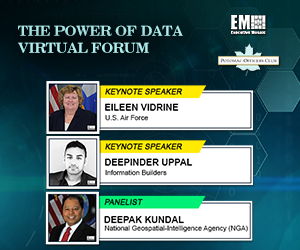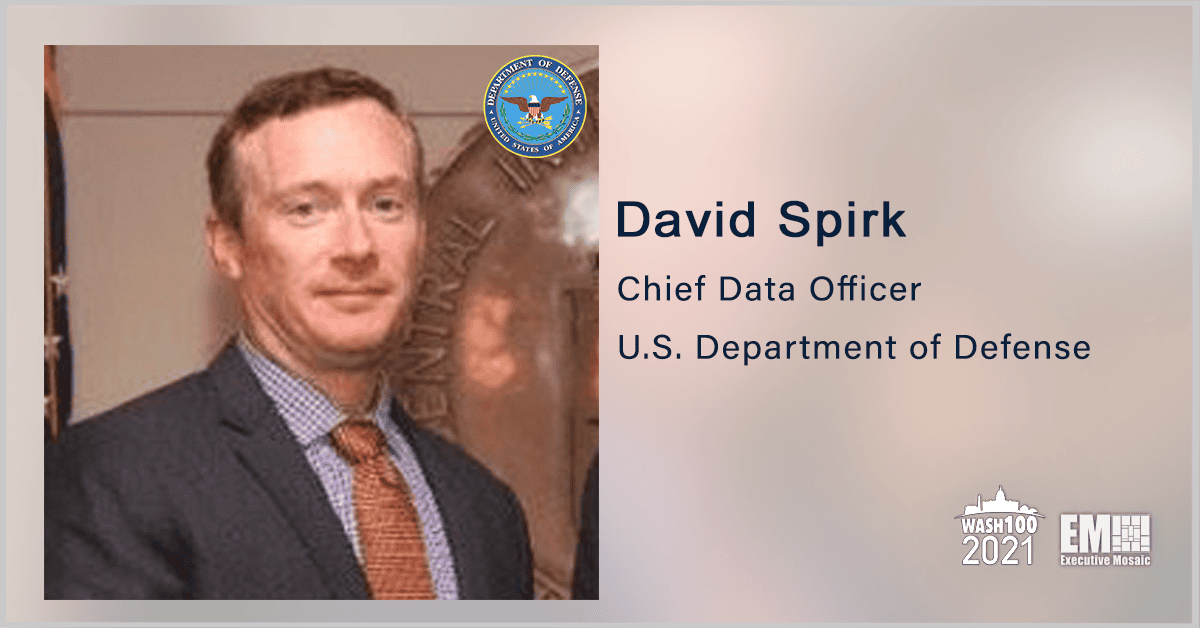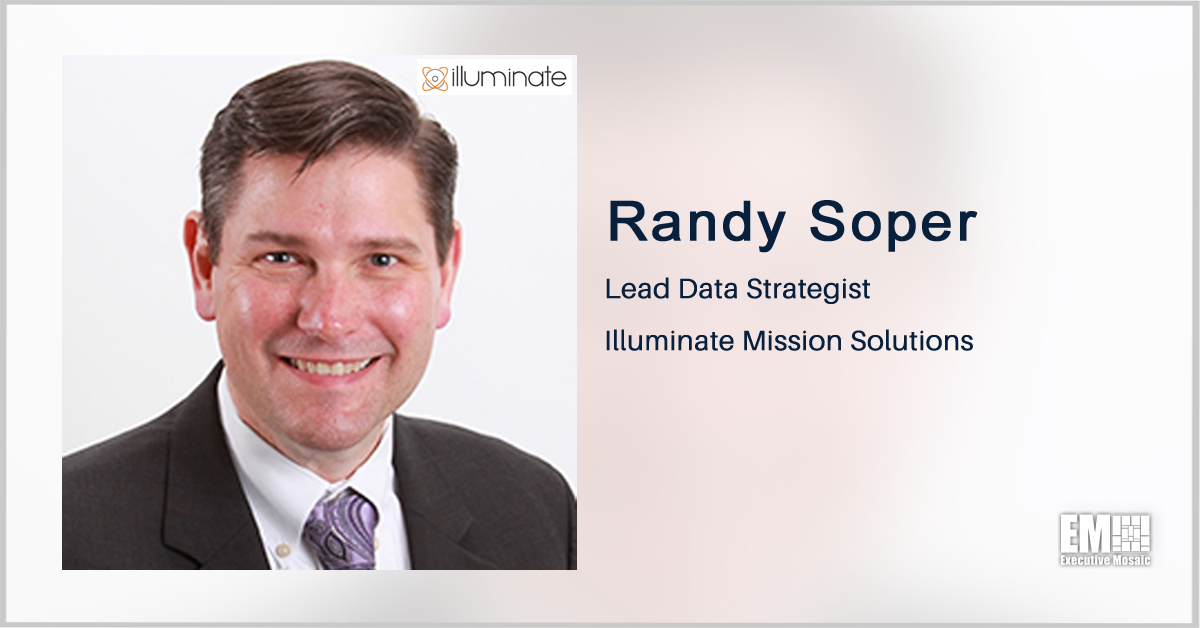Potomac Officers Club hosted The Power of Data Virtual Event on June 10th, featuring Eileen Vidrine, chief data officer with the U.S. Air Force (USAF), and Deepinder Uppal, vice president of the Public Sector with Information Builders, as the keynote speakers as well as Deepak Kundal, chief data officer with the National Geospatial-Intelligence Agency (NGA), who gave a fireside chat.
Dave Kelly CPT (Ret.), vice president for Public Sector Solutions and Strategy at Information Builders, introduced the speakers while providing a background on their notable accomplishments, experience and qualifications.

Following Kelly’s introduction, Vidrine began the opening keynote address discussing how the Air Force has developed the data center as well as her role as the service branch’s chief data officer.
Vidrine provided an overview of where the division will continue to develop. For instance, the data division will work to lead data culture and drive data capabilities to become a major player in the future of data.
“We were presented with an amazing vision, but we needed to operationalize. We helped the construct evolve in fiscal year 2019, now we are maturing the model. The work we did in 2019 has allowed us to leverage our strategic assets,” Vidrine said.
She also noted that the Air Force will partner with the industry to streamline processes to enhance the data division. Vidrine has worked to embrace digital transformation by uniting her strategy and government to bring core Agile capabilities to the private sector and enhance security, revenue and modernization.
“A critical part of our method is to develop a digital department of the Air Force, and the key to doing that is to create valuable partnerships. It’s not just about the data. You have to have a secure connection and you have to optimize business practices,” Vidrine added.
Vidrine also discussed how the USAF has done approximately 12 enterprise level use cases to help senior leaders have data driven insights into the decision making process. The service branch’s goal is to increase visibility, improve analytics capabilities and manage data growth.
“90 percent of data has been generated within the last 18 months. The velocity of data continues to grow, and that’s only going to continue. So it is very important that we have great mechanisms to make data visible and accessible so that we’re investing in the collect data growth moving forward.

Following Vidrine’s keynote address, Uppal took the podium to discuss the concept of bringing data back into the vault to focus the mission at hand and develop a unified strategy, while also maintaining and advancing the structure and organization of data.
“The concept of integration is at an all time high. Only now are people understanding the problems of data silos and what can be done to overcome them,” Uppal stated.
He addressed Operation Dark Winter, a strategy to discover how federal and local agencies would fare when faced with a national emergency. The operation simulated a national emergency that led to breaking down silos and the understanding of what would take place.
“The lesson that we’ve learned is that in every scenario, the results speak to the lack of situational awareness and preparedness, stemming from the fact that there were problems with the analytics,” Uppal added.
Uppal noted that once the data systems are stressed, there is a complete breakdown of the system. People were faced with a data restructuring which takes time and is often followed by tragedy, as shown through the COVID-19 pandemic. Of the common lessons derived from COVID-19, Uppal discussed the lack of confidence in the government as it strived for resiliency.
Uppal explained how the federal government has learned that data and analytics associated with a surge of capacity needs to be constantly managed from enterprise to government. While it’s monitored in silos, he stated that each has a different logical system. That can make it difficult to migrate the data and overcome problems associated with the divide.
In addition, he commented about the lack of data and our inability to present data to the public with the current set of challenges. Our inability to understand media trends and public sentiment and open source intelligence (OSINT) also present larger problems in the realm of media. Uppal noted that situational awareness is more than just emergency preparedness.
“Situational awareness is being able to perceive and comprehend related and disparate events in near real time and use this information with past experiences to inform strategic decision making, present predictive alerts and provide dynamic reporting,” Uppal added.
While there is an abundance of OSINT, the problem lies within bringing the data together to integrate it and understand what needs to be done. Agencies must accommodate modern methods to make data accessible to derive situational awareness and continue to data integration for the future through the use of artificial intelligence for data scientists to move the concept to the next level.

Following his address, Uppal and Kundal participated in a Q&A panel and spoke on how integration will influence the culture of data. Kundal specifically noted that NGA has created a policy to discover how to treat data.
He explained that we should be treating data as an enterprise asset, to manage the data as an asset, not as an entity. Kundal has worked to uncouple data from applications and make it more accessible and productive since breaking down silos will enable centralization of data.
“Data has to be shared with responsibility and updated consistency to remain reliable and useful. Data management has to also secure data and has to span lifecycle, acquisition, etc. to outline a strategy to begin a culture change. If you cannot communicate data, it will be difficult to migrate solutions,” Kundal stated.
Kundal also noted that building a database is critical for an organization to understand what is being asked of its data scientists. To leverage data, most federal agencies are focused on gathering data and not analyzing data.
“That is a very wrong use of a data scientists’ time. It’s imperative that gathering, building and cleansing of the data has to remain available to make it available to data scientists and allow the data scientists to do their jobs,” Kundal explained.
He added that automation and machine learning are key elements in advancing data and the workforce to migrate data and provide a unified platform to expedite predictions and the use of information to drive insightful outcomes.

Potomac Officers Club’s next event will be its CMMC Virtual Forum 2020 on June 24th. Click here to register for the event that will address the CMMC’s timeline, how the certification process could change and will provide a memorandum of understanding with a newly established CMMC accrediting body.
Katie Arrington, chief information security officer at the Office of the Assistant Secretary of Defense for Acquisition and a 2020 Wash100 Award recipient, will serve as the keynote speaker.
A full expert panel will also be featuring Ty Schieber, senior director of executive education and CMMC-AB chairman of the University of Virginia and Richard Naylor of the Defense Counterintelligence and Security Agency (DCSA) and other members of the federal sector and industry to discuss the impact DoD’s CMMC will have on cybersecurity practices, supply chain security and other aspects of the federal market.
Register here to join Potomac Officers Club for its CMMC Virtual Forum 2020 on June 24th.






